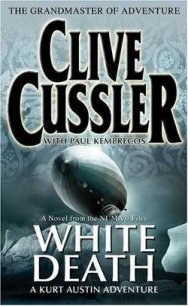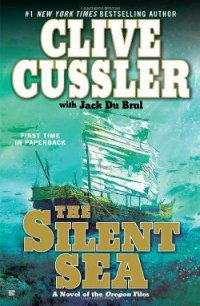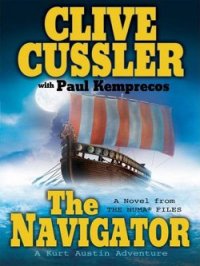Lost City - Cussler Clive (читать книги полные TXT) 📗
At one point Sandy slowed the Alvin's descent and the submersible hovered near a chimney whose flat top was at least thirty feet across. The tower seemed to be alive and moving. The chimney was covered with mats of growth that undulated in the bottom currents as if in rhythm to music from the speakers.
Gamay let out the breath she'd been holding. "This is like being in a dreamscape."
"I've seen it before and I'm still in awe," Sandy said. She steered the Alvin close to the top of the tall column. "This is where it gets really interesting. The warm water coming from below the sea bottom rises and becomes trapped under those flanges. Those mats you see are actually dense microbe communities. The flanges trap the 160-degree alkaline fluids that stream up the chimneys from below ocean crust that is 1.5 billion years old. The water carries methane, hydrogen and minerals emitted by vents. Some people think we may be looking at the beginnings of life," she said in a hushed voice.
Trout turned to his wife. "I'm strictly a rock-and-gravel guy," he said. "As a biologist, what do you think of that theory?"
"It's certainly possible," Gamay said. "The conditions out there could be similar to what they were in the early days of the earth. Those microbes living around the columns resemble the first life-forms to evolve in the sea. If this process can occur without volcanoes, it greatly increases the number of locations on the seafloor of early earth where microbial life could have started. Vents like these could be incubators for life on other planets as well. The moons of Jupiter may have frozen oceans that could be teeming with life. The Mid-Atlantic Ridge is hundreds of miles long, so the potential for new discoveries is endless."
"Fascinating," Trout said.
"Where's the Gorgon weed epicenter from here?" Gamay asked.
Sandy squinted at her instruments. "A little east of here. The Alvin % speed is rather underwhelming two knots tops so sit back and enjoy the ride, as the airline pilots say."
The towers thinned out and began to vanish as the submersible moved out of the Lost City. Eventually, however, the lights began to pick out more spires.
Sandy let out a low whistle. "Wow! It's a whole new Lost City. Unbelievable!"
The submersible wove its way through a thicket of towers that extended in every direction beyond the range of the vehicle's bright lights.
"This makes the original Lost City look like East Podunk," Trout said, as he peered with wondering eyes through the view port. "We're talking about real skyscrapers here. That one looks like the Empire State Building."
"Ugh," Gamay said a moment later. "Guess this is the place. Reminds me of kudzu."
They were coming up on a dark green curtain of algae that floated like a smoky pall among the pinnacles.
The Alvin rose about thirty feet, passed over the cloud, then dropped back down once they were clear.
"Funny to see stuff like that at this depth," Gamay said, with a shake of her head.
Trout was staring out his view port. "That's not all that's funny," he murmured. "Am I seeing things off to the right?"
Sandy steered the Alvin so the full force of the klieg lights was directed at the sea bottom.
"It can't be!" she said, as if she had seen a McDonald's on a corner of the newly discovered undersea metropolis. She brought the submersible to within a few yards of the bottom. Two lines of parallel tracks at least thirty feet apart led off into the darkness. "Seems we're not the first visitors," Trout said.
"It looks as if a giant bulldozer passed this way," Sandy said. "But that's impossible." She paused, and then in a hushed tone, said, "Maybe this really is the lost city of Atlantis."
"Nice try, but these tracks look too recent," Paul said.
The tracks went straight for a while, and then curved between two towers that soared for nearly three hundred feet. At several points along the way, they came upon towers lying on their sides like toppled bowling pins. Other pillars had been ground to powder by giant treads. Something very large and powerful had cut a swath through the new Lost City.
"It looks like an undersea clear-cutting operation," Trout said.
Gamay and Paul worked the video and still cameras to record the scene of destruction. They were at least a half mile into the new vent field. The original Lost City was like a pine woods compared to a redwood forest. Some of the towers were so tall that their summits were invisible. From time to time, they had to detour around great blobs of algae.
"Thank goodness for those cameras," Sandy said. "The folks on the surface would never believe what we're seeing."
"I don't quite believe it myself," Trout said. "I What was that}"
"I saw it, too," Gamay said. "A big shadow passed over us." "A whale?" Trout said. "Not at this depth," Gamay replied.
"What about a giant squid? I've heard they can dive deeper than whales."
"Oh, anything is possible in a place like this," Gamay said.
Trout asked Sandy to put the vehicle into a slow spin.
"No problem," Sandy said, working the controls. The vehicle slowly began to pivot. They were in the middle of a tight concentration of towers that obscured sight in every direction.
The towers directly in front of the Alvin seemed to be vibrating
like strings in a piano. Then two or three of the spires crumbled in slow motion and disintegrated in a smoky cloud. Trout had a vague impression that something black and monstrous in size was emerging from the smoke screen and heading directly for them.
Trout yelled at Sandy to put the Alvin in reverse, knowing that it was too slow to evade anything faster than a jellyfish, but the pilot was transfixed by the advancing behemoth and didn't respond until it was too late.
The vehicle shuddered and a loud metallic clunk rattled the pressure hull.
Sandy tried to move the submersible backward, but there was no response from the controls.
Trout glanced through the view port again.
Where an instant before, the lights had illuminated a forest of white and beige towers, a monstrous mouth yawned ahead.
Inexorably, the Alvin was drawn into the great glowing maw.
THE ALVIN HAD failed to answer the call, and thought it was not yet due to surface, concern was mounting aboard the Atlantis with each passing moment. There had been little apprehension at first. The submersible had an impeccable safety record and carried reliable backup systems in case of an emergency. Tension had already ratcheted up to a high peak when the strange ship showed up. Charlie Beck leaned against the rail, examining the vessel through his binoculars. It was a small freighter well past her prime. Its hull was splotched with cancerous rust spots and was badly in need of a coat of paint. The ship seemed haunted by a general air of neglect. Painted below the name on the scarred hull was the country of registration, Malta.
Beck knew that the freighter was probably neither Celtic nor Maltese, and that these were designations of convenience. The ship's name could have been changed five times in the last year. Its crew would undoubtedly be low-paid sailors from third or fourth world countries. It was the perfect example of a potential pirate ship or terrorist ship, what some in the maritime security business call the "Al Qaeda navy."
As a professional warrior, Captain Charlie Beck lived in a relatively uncomplicated world. Clients gave him jobs to do, and he did them. In his rare reflective moments, Beck thought that one day he should erect a memorial paying homage to Blackbeard the pirate. Had it not been for William Teach and the bloodthirsty brethren who succeeded him, Beck reasoned, he would not have his Mercedes, his speedboat on Chesapeake Bay or his trophy house in Virginia horse country. He'd be a broken-down paper-pusher, sitting behind a desk in the Pentagon labyrinth, staring at his service pistol and thinking about putting a bullet in his brain.




